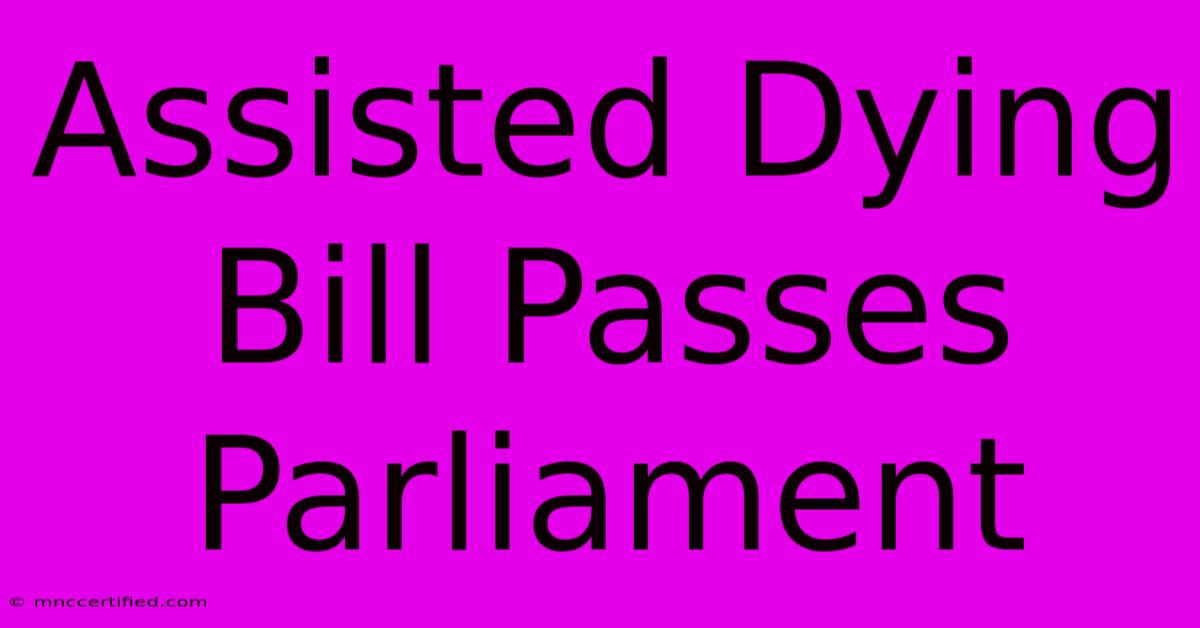Assisted Dying Bill Passes Parliament

Table of Contents
Assisted Dying Bill Passes Parliament: A New Era of End-of-Life Care?
The recent passage of the Assisted Dying Bill through Parliament marks a significant turning point in the ongoing debate surrounding end-of-life care. This landmark legislation, while celebrated by some and mourned by others, raises complex ethical, legal, and societal questions that demand careful consideration. This article will delve into the key aspects of the bill, exploring its implications and the ongoing discussions surrounding its impact.
Key Provisions of the Assisted Dying Bill
The specifics of the Assisted Dying Bill will vary depending on the jurisdiction. However, common provisions generally include:
- Eligibility Criteria: Strict eligibility criteria are typically in place to prevent abuse. These might include a terminal illness with a prognosis of less than six months to live, the capacity to make informed decisions, and a repeated, voluntary request for assistance in dying. Independent medical assessments are usually required to confirm the patient's diagnosis and capacity.
- Safeguards and Protections: The bill almost certainly incorporates robust safeguards to protect vulnerable individuals. This could involve mandatory consultations with multiple medical professionals, psychological evaluations, and a waiting period between requests. The goal is to ensure the patient's decision is truly voluntary and informed.
- Conscientious Objection: The legislation likely allows healthcare professionals to opt out of participating in assisted dying procedures if it conflicts with their personal beliefs, without facing penalties. This provision aims to balance individual rights with the professional responsibilities of healthcare providers.
- Reporting and Oversight: A system for reporting and reviewing assisted dying procedures will likely be established to monitor the implementation of the law and identify any potential issues. This data is crucial for evaluating the effectiveness and safety of the legislation.
Arguments For and Against Assisted Dying
The debate surrounding assisted dying is deeply emotional and often polarized. Understanding both sides is critical to a balanced perspective.
Arguments in Favor:
- Autonomy and Self-Determination: Proponents argue that individuals should have the right to make decisions about their own lives and deaths, particularly when facing unbearable suffering. The ability to choose a peaceful and dignified end is considered a fundamental aspect of autonomy.
- Relief from Suffering: Assisted dying is viewed as a compassionate option for individuals experiencing intractable pain and suffering that cannot be adequately managed by palliative care. It offers a way to escape prolonged and agonizing experiences.
- Control over the End of Life: Many believe that having control over the timing and manner of their death offers a sense of peace and dignity in the face of a terminal illness. This control can reduce anxiety and improve the quality of life in the final stages.
Arguments Against:
- Slippery Slope Concerns: Opponents worry that legalizing assisted dying could lead to a "slippery slope," potentially expanding eligibility criteria and endangering vulnerable populations such as the elderly or disabled.
- Potential for Abuse: Concerns exist that individuals might be coerced or pressured into choosing assisted dying, even if it is not their genuine desire. Safeguards, while important, may not be completely foolproof.
- Role of Healthcare Professionals: Some object to the involvement of healthcare professionals in assisted dying, arguing it violates their ethical obligations to preserve life. This ethical dilemma highlights the complex interplay between patient autonomy and professional responsibility.
- Religious and Moral Objections: Many religious and moral objections exist based on the belief that life is sacred and should not be intentionally ended. These objections often stem from deeply held convictions about the sanctity of life.
The Road Ahead: Challenges and Considerations
The passage of the Assisted Dying Bill doesn't mark the end of the discussion; rather, it initiates a new phase. Ongoing challenges include:
- Monitoring and Evaluation: Rigorous monitoring and evaluation of the legislation's implementation are crucial to ensure its effectiveness and identify any unintended consequences. Regular review and adjustments might be necessary.
- Public Education and Awareness: Increased public education and awareness are essential to promote understanding of the law and address misconceptions. Open and honest conversations about end-of-life care are needed.
- Access and Equity: Ensuring equitable access to assisted dying services, regardless of geographic location or socioeconomic status, is vital to prevent disparities in care.
- Continued Ethical Debate: The ethical and societal implications of assisted dying will continue to be debated and discussed, prompting ongoing refinement of the legal framework and supporting services.
The passage of the Assisted Dying Bill represents a significant shift in how society approaches end-of-life care. While it offers a potentially compassionate option for some, it also necessitates careful consideration of the ethical, legal, and societal implications. Ongoing monitoring, public education, and open dialogue are crucial to navigating this complex landscape and ensuring that the legislation serves its intended purpose fairly and ethically.

Thank you for visiting our website wich cover about Assisted Dying Bill Passes Parliament. We hope the information provided has been useful to you. Feel free to contact us if you have any questions or need further assistance. See you next time and dont miss to bookmark.
Featured Posts
-
Live Brighton Vs Southampton Premier League
Nov 30, 2024
-
Blackrock Target Income Bond
Nov 30, 2024
-
James Bond Porfirio Rubirosa
Nov 30, 2024
-
Ccpc Use Homebase Vouchers Wisely
Nov 30, 2024
-
Power Bond Harmonic Balancer
Nov 30, 2024